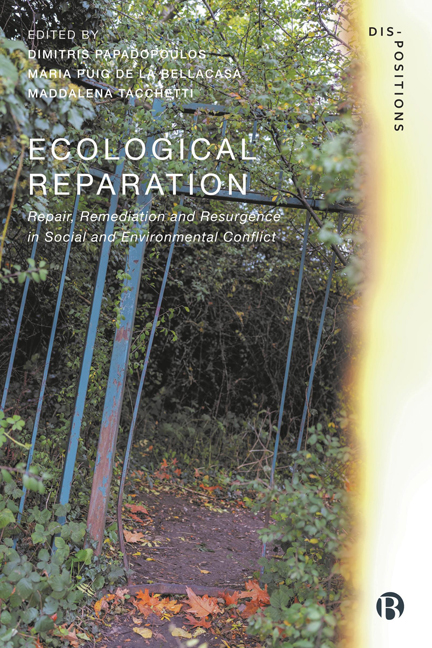Book contents
- Frontmatter
- Contents
- List of Figures
- Notes on Contributors
- Acknowledgements
- Note on the Figures
- Dis-Positions Series Preface
- Introduction: No Justice, No Ecological Peace: The Groundings of Ecological Reparation
- PART I Depletion<>Resurgence
- PART II Deskilling<>Experimenting
- PART III Contaminating<>Cohabiting
- PART IV Enclosing<>Reclaiming Land
- PART V Loss<>Recollecting
- PART VI Representing<>Self-governing
- PART VII Isolating<>Embodying
- PART VIII Growth<>Flourishing
- Index
12 - Waste, Improvement and Repair on Ireland’s Peat Bogs
Published online by Cambridge University Press: 28 March 2024
- Frontmatter
- Contents
- List of Figures
- Notes on Contributors
- Acknowledgements
- Note on the Figures
- Dis-Positions Series Preface
- Introduction: No Justice, No Ecological Peace: The Groundings of Ecological Reparation
- PART I Depletion<>Resurgence
- PART II Deskilling<>Experimenting
- PART III Contaminating<>Cohabiting
- PART IV Enclosing<>Reclaiming Land
- PART V Loss<>Recollecting
- PART VI Representing<>Self-governing
- PART VII Isolating<>Embodying
- PART VIII Growth<>Flourishing
- Index
Summary
Introduction
About 20 per cent of the surface of Ireland is covered in bogs, including the blanket bogs along the western coast and the raised bogs in the midlands. Long treated as ‘wastelands’ by colonial and postcolonial policy, it is estimated that there has been a 99 per cent loss of the original area of actively growing raised bogs in Ireland (EPA, 2011). This happens when bogs are drained – without water, the bogs cease to be bogs. The rural midlands, since the 1950s, have been the site of large-scale industrial turf-cutting by the semistate company Bord na Móna (BnM). These cut peatlands, open mines across the island’s boggy central regions, are now post-industrial landscapes or ‘brownfields’, as official policy refers to them. While the remnants of living bog provide habitats to many rare species of plant and animals and sequester carbon from the atmosphere, most drained and cut bogs today act as wastelands of modernity, as after their transformation for industrial activity, these largely barren landscapes continue actively emitting carbon which for centuries has been locked underground.
In 2018, BnM announced plans to phase out industrial extraction of peat by 2030, joining the Irish state’s efforts to de-carbonize. As one of the country’s largest landholders, with a landbank of around 200,000 acres (about 1 per cent of Ireland’s total landmass), these ‘ruined’ environments may be central to the country’s ‘green’ and ‘smart’ futures as sites of de-carbonization and remediation, carbon sequestration and information services. The company must balance its obligation to deliver a ‘just transition’ for the hundreds of industrial workers and communities organized around peat-cutting with contributing to the state’s commitment to transition to 70 per cent renewable energy in the country by 2030.
Current discourses and associations of peat bogs and waste resonate with discourses from the 18th and 19th centuries, when efforts to drain and reclaim these waterlogged ‘wastelands’ by British colonial authorities were justified by moral and economic studies and mapping projects. The colonial division of the world into a patchwork of territories for extraction has frequently stressed treatment of the ‘wild’ or the ‘terra nullius’ in colonial imaginaries, concepts which allowed administrators and capitalists to make landscapes legible, populations manageable, and territories inert for extraction (see Yusoff, 2018).
- Type
- Chapter
- Information
- Ecological ReparationRepair, Remediation and Resurgence in Social and Environmental Conflict, pp. 175 - 193Publisher: Bristol University PressPrint publication year: 2023

